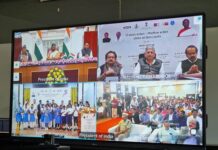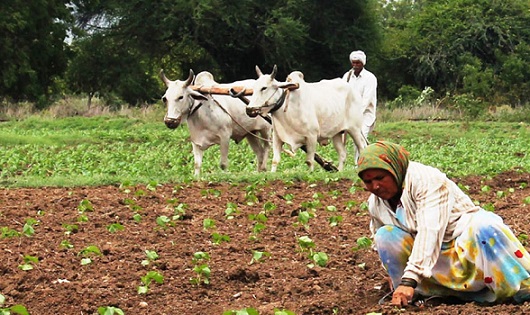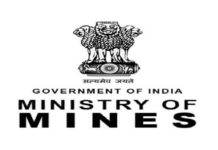By Our Correspondent
NEW DELHI: The Union Minister of Agriculture and Farmers Welfare Narendra Singh Tomar in Lok Sabha said that the Government fixes Minimum Support Prices (MSPs) for 22 mandated agricultural crops on the basis of the recommendations of the Commission for Agricultural Costs & Prices (CACP), after considering the views of State Governments and Central Ministries/Departments concerned and other relevant factors. While recommending MSP, CACP considers various factors viz. cost of production, overall demand-supply situations of various crops in domestic and world markets, domestic and international prices, inter-crop price parity, terms of trade between agriculture and non-agriculture sector, likely effect of price policy on rest of economy and a minimum of 50 percent as the margin over cost of production.
The Union Budget for 2018-19 had announced the pre-determined principle to keep MSP at levels of one and half times of the cost of production. Accordingly, Government has increased the MSPs for all mandated Kharif, Rabi and other commercial crops with a return of atleast 50 per cent overall India weighted average cost of production for the agricultural year 2018-19 and 2019-20. In line with the same principle, Government has recently (1st June 2020) announced the increase in MSP for all mandated kharif crops for marketing season 2020-21.
MSP is determined for the country as a whole and not region or state-specific. The 22 mandated crops, for which MSP is being announced by the government for the last three years, include 14 Kharif crops viz. paddy (Common and Grade ‘A’), jowar (Hybrid and Maldandi varieties), bajra, maize, ragi, arhar, moong, urad, groundnut, soyabean, sunflower, sesamum, nigerseed, cotton (medium staple and long staple variety) and 6 Rabi crops viz. wheat, barley, gram, masur (lentil), rapeseed & mustard, safflower and two commercial crops viz. jute and copra (milling and ball copra). In addition, MSP for toria and de-husked coconut are also fixed on the basis of MSPs of rapeseed & mustard and copra respectively.
During the lockdown situation, the agriculture sector is functioning smoothly. Government of India has taken all necessary measures to ensure smooth sowing operation during pre-monsoon and monsoon period. All the necessary exemptions were allowed for agricultural activities during lockdown period.
As per the Provisional Estimates of National Income 2019-20 released by the Central Statistics Office (CSO), Ministry of Statistics and Programme Implementation on 31st August, 2020 the growth rate of real Gross Value Added (GVA) of Agriculture & Allied sectors is 3.4 % in the First Quarter (April-June), 2020-21.Assistance under MGNREGA and PMGKAY is being provided to agricultural labourers etc.
Under the Pradhan Mantri Kisan Samman Nidhi (PM-KISAN) Scheme since inception and as on 15/09/2020 about 10.19 crore farmer families have been benefitted and an amount of Rs.94,1305 crore was released. During the period of lock down, an amount of around Rs. 410,86 crores (as on 15-09-2020) has been disbursed to various beneficiaries under the Scheme covering various instalments.
The Government had provided the facility of Kisan Credit Card to the farmers to invest in crops and animal husbandry and fisheries. Now the beneficiary farmers of PM-KISAN Scheme are also getting the facilities of Kisan Credit Card. There is no mortgage required to avail loan up to Rs1.60 lakh.
Under Pradhan Mantri Fasal Bima Yojana (PMFBY), total claims of Rs 5,326.7 crores were paid during lockdown period, PMFBY was made more efficient and farmer friendly and made voluntary for all farmers. Government of lndia will now bear 90% of premium subsidy liability for North Eastern States instead of 50% earlier. Further benefit of 2% interest subvention (lS) to Banks and 3% Prompt Repayment Incentive (PRI) to all farmers for all crop loans up to Rs. 3 lakhs given by banks was extended till 31/08/2020.






























